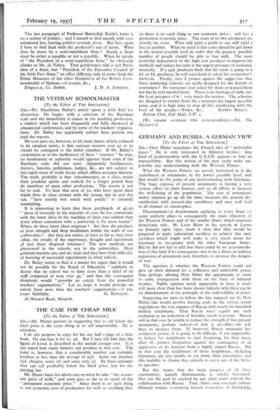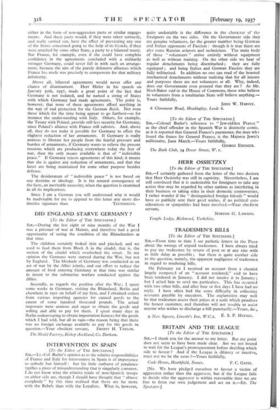GERMANY AND RUSSIA: A GERMAN VIEW
[To the Editor of THE SPECTATOR.]
Sta,—Herr Hitler repudiates the French idea of "indivisible peace." He is only interested in bilateral treaties. Any kind of understanding with the U.S.S.R. appears to him an impossibility. But this notion of his may easily make im- possible any understanding with the Western Powers.
What the Western Powers are mostly interested in is the curtailment of armaments to the lowest possible level, and that would be the point of any understanding with Germany. The huge expense of present armaments is having a very serious effect on their finances and on all efforts to increase the well-being of the population. The cost of armaments makes taxation go up all the time, increases the general dis- satisfaction with present-day conditions and may well lead to all manner of catastrophes.
Disarmament—a disarmament applying to every State 1-:a some uniform plan—is consequently the main objective of the Western Powers and of the smaller States which maintain democratic rule. M. Leon Blum in his speech at Lyons on January 24th, 1937, made it clear that they would be prepared to make substantial sacrifices to achieve this end, sacrifices which might well make it very much easier for Germany to co-operate with the other European States. But he did not fail to add that there could be no accommoda- tion of this kind if its consequence was to be a direct or, indirect expansion of armaments and, therefore, to increase the dangers of war.
The question is whether the Western Powers could not give up their demand for a collective and indivisible peace, thus perhaps offering .Herr Hitler the opportunity to come to some arrangement with them on the basis of bilateral treaties. Public opinion needs apparently to have it made will more clear than has been shown hitherto why there can be no abandonment of the principle of the indivisibility of peace.
Supposing we were to follow the line mapped out by Herr Hitler, this would involve leaving aside in the various treaty negotiations the vast expanse of Russia with nearly two hundred million inhabitants. That Russia must regard any such exclusion as an indication of hostility stands to reason. Russia will in that case be unable to reduce the strength of her present armaments, perhaps indeed—if that is possible—she will have to increase them. If, however, Russia maintains her armament power, it is going to be difficult, if not impossible, to induce her neighbours to start disarming, for they must, after 1111, protect themselves against the contingency of an aggression or an invasion from a highly armed Russia. But in that case the neighbours of those neighbours, including Germany, are also unable to cut down their armaments, and this inability to disarm thus extends to every one of the States in question.
But this means that the main purpose of all these conventions, namely disarmament, is wholly frustrated. Nor can the goal be reached by any other route without the collaboration with Russia. True, States may conclude various bilateral treaties containing mutual assurances of friendship, either in the form of non-aggression pacts or similar engage- ments. And these pacts would, if they were taken seriously, and really carried out, have the effect of preventing any one of the States concerned going to the help of its friends, if they were attacked by some other State, a party to a bilateral treaty. But France, for example, even if she could have complete confidence in the agreements concluded with a militarily stronger Germany, could never fall in with such an arrange- ment, because the aim of the purely defensive alliances which France has made was precisely to compensate for that military inferiority.
Above all, bilateral agreements would never offer any chance of disarmament. Herr Hitler in his speech on January 30th, 1937, made a great point of the fact that Germany is not isolated, and he named a string of States with which Germany had made agreements. The point is, however, that none of these agreements afford anything in the way of real protection for the German Reich. Not even those which for the time being appear to go furthest—as for instance the understanding with Italy. Others, for example, the Treaty with Poland, provide still less security for Germany, since Poland's alliance with France still subsists. And, above all, they do not make it possible for Germany to effect the slightest reduction of her armaments. If Germany is really anxious lo liberate her people from the fearful pressure and burden of armaments, if Germany wants to relieve the present tensions which are producing everywhere today the fear of war, then the only means available is that of "indivisible peace." If Germany rejects agreements of this kind, it means that she is against any reduction of armaments, and that the latter are being maintained for some other purpose besides defence.
The desideratum of "indivisible peace" is not based on any doctrine or ideology. It is the natural consequence of the facts, an inevitable necessity, when the question is examined in all its implications.
Since I am a German you will understand why it would be inadvisable for me to append to this letter any more dis-















































 Previous page
Previous page